 Abengoa
Abengoa
Annual Report 2013
- Activities
- Activities
- Engineering and construction
With more than seventy years experience in the energy and water engineering and construction market, Abengoa specializes in technological and innovative turnkey solutions worldwide: solar plants, hybrid solar-gas plants, conventional power plants, biofuel plants, hydro infrastructures, including large-scale desalination plants, wind farms and power transmission lines, among others.
Engineering and construction business

Abengoa is experiencing excellent times in the area of Engineering and Construction (E&C). It is the international leader in the construction of electrical infrastructures, transmission lines, solar and power plants, according to the ranking published by the prestigious specialist ENR (Engineering News-Record). While the international crisis is abating, specifically in the construction sector, Abengoa joins the group of companies spearheading the business worldwide. The company has achieved excellent results in the area of E&C, €4,882 M in order intake and €6,796 M in the backlog, making up more than half of Abengoa’s turnover.
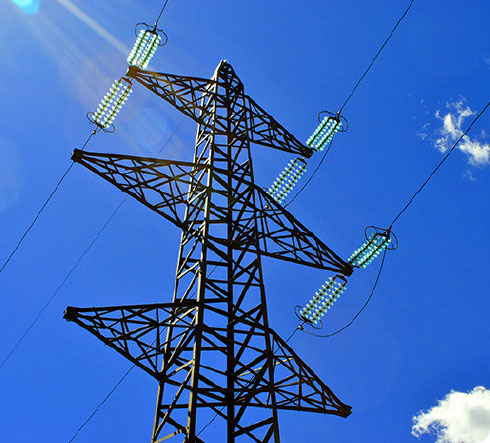
The company has E&C projects in more than forty countries spanning five continents. With the general stagnation of the European market, and the Spanish market in particular, Abengoa continues with its progressive and unceasing internationalization process, mainly in the Americas, Asia and Africa. In particular, the US, China and India are expected to see the most growth, which will make these countries the leading world markets over the next decade.
Abengoa continues growing in the US, which is its main strategic market, where it occupies 7th place as international contractor, according to the ENR. The region of Latin America and the Caribbean, where it occupies 5th place, remains a key objective for the company. The Americas amounts to 50 % of the company’s business. In addition, Abengoa secured its position in Africa where it has consolidated itself as a benchmark transmission and distribution contractor.
Since its beginnings, Abengoa has constructed over 45,000 km of transmission lines, equal to three times the earth’s diameter. It has developed projects on all continents in countries such as Brazil, Algeria, Australia, France, Mauritania, Saudi Arabia, Spain and Morocco, and with the securing of new projects in the US and Ukraine in the course of 2013, the list continues to grow.
The multinational also knows how to capitalize on the growing international interest for renewable energies. Many countries have undertaken medium and long-term plans to build clean energy plants. Abengoa is well placed to compete and offer solutions adapted to their needs.
These exciting times for the company translate into the identified opportunities for the coming years. Abengoa boasts a diverse and extensive portfolio of international clients who rely on the multinational’s experience to carry out their engineering and construction projects, and it manages its own assets. The awarding of new projects in turn becomes a port of entry into strategic markets where the company previously had no presence.
Abengoa collaborates in the development of corporations where it operates, promoting global sustainable growth. Emerging and developing countries require infrastructures for their continued growth. Electricity, water, transportation and fuels are key elements for growth. Abengoa is a global company that works on a local level, contracting local workers and vendors, implementing social projects for favorable social integration and equal opportunities and creating environmental programs to minimize the negative impact of executed works and the emission of greenhouse gases.
The individuals of the Abengoa team are essential to achieving the company’s strategic objectives. Talent acquisition, continuous training and performance appraisal are just some elements of the company’s human resource strategy, where the number of jobs created in E&C continues to rise in locations such as North America, showing a 31 % increase over 2012, and Africa, with a 57 % increase in recruitments.
The company invests in its own technological development for its implementation in the design of new projects. The knowledge gained from operating these projects has a knock-on effect on innovation, favoring the development of more and better technology. This serves to generate a process of continuous improvement in R&D and innovation, which is one of the company’s greatest competitive advantages.
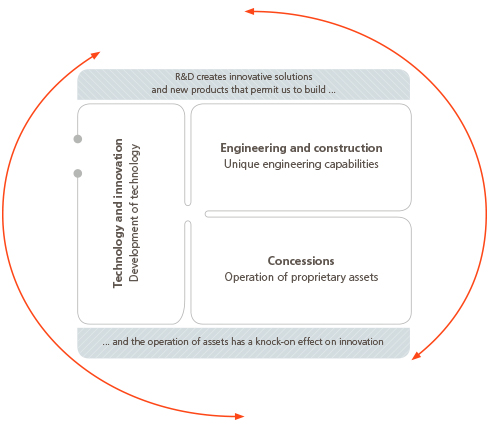
Abengoa operates the engineering and construction business in four complementary sectors and with a diverse project portfolio:
- Energy generation:
- Renewable energies: solar (tower, parabolic trough, hybrid solar-gas and photovoltaic plants) and wind.
- Conventional generation: combined cycle, cogeneration and biomass plants.
- Biofuels: bioethanol, biodiesel and ETBE [a gasoline additive].
- Transmission and distribution:
- Transmission lines.
- Electrical substations.
- Water and the environment:
- Desalination plants.
- Water treatment and reuse plants.
- Water transportation and distribution.
- Waste.
- Infrastructures and services:
- Industrial plants.
- Electrical and mechanical installations.
- Railway lines.
- Manufacture of metal structures and towers.
- Marketing and auxiliary manufacturing.
- Telecommunications.
- Specific buildings.
This diversification strategy enables the company to develop large-scale turnkey projects where it is also able to offer operation and maintenance services. In an ever-changing economic climate, it is one of the competitive advantages that will help Abengoa realize its goal of becoming the international leader in innovative technology solutions in the energy and environment sectors that contribute toward sustainable development.

Power transmission lines and substations built by Abengoa since 2000
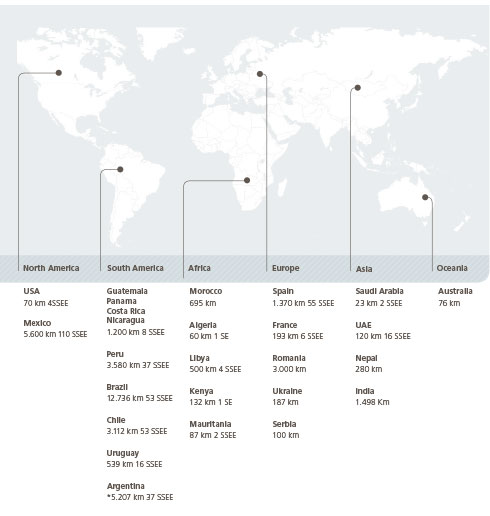
(*) Includes power transmission lines built before 2000.
Map of energy and environment projects
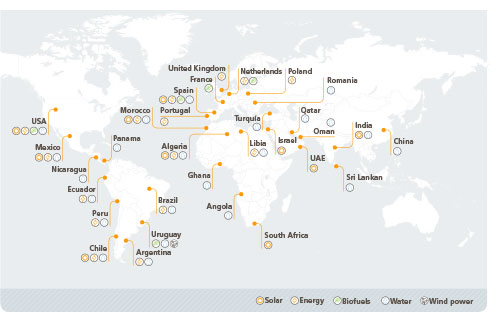
The Americas:
The US
- The US electric utility Portland General Electric (PGE) has commissioned Abengoa to carry out the engineering, design and construction of a 440 MW combined cycle plant to supply electricity generated from natural gas to half the population of Portland (Oregon).
- New plant for generating electricity from municipal waste located in Glendale (Arizona). This project will treat up to 180,000 t of municipal solid waste per year to generate 15 MW of electricity for the renewable energy company Vieste Energy LLC. The contract includes the EPC (engineering, procurement and construction) and operation and maintenance of the plant for 30 years. The technology used at the plant was developed by Abengoa.
- Abengoa has secured its first transmission project in the US. Imperial Irrigation District has awarded the company the contract to extend a 32 km, 230 kV transmission line with three substations in southern California. Completion of the project is scheduled for April 2014.
- Abengoa was selected by the company Rentech Nitrogen to develop a 15 MW cogeneration plant in Pasadena (Texas). Abengoa will carry out the EPC. The generated energy will be used by the Rentech fertilizer plant and the surplus will be sold on the Texas electricity market.
- Arizona Public Services (APS) has commissioned Abengoa for 7,300 t of structures for its new Hassayampa-North Gila transmission line in the southwest of the US.
- Construction is underway on the 280 MW parabolic trough solar thermal plant being built by Abengoa in California’s Mojave Desert. The project will supply electricity to 90,000 homes, curbing annual CO2 emissions by approximately 437,000 t. Like the Solana plant, it will be one of the world’s largest solar plants.
- Abengoa will develop two 10- and 20-MW photovoltaic plants for EDP renewables in California. Both plants, which will come into operation in the third quarter of this year, will supply sufficient clean energy to supply some 5,000 homes, reducing energy and fuel consumption as well as carbon dioxide emissions.
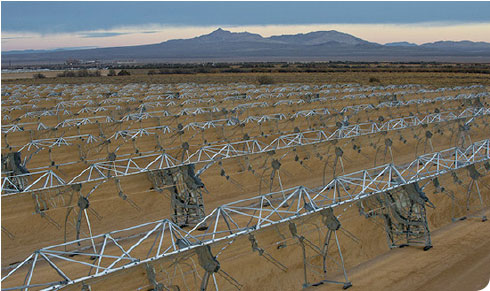
- Construction of the world’s first commercially operational, second-generation bioethanol plant is in progress. It will produce ethanol from biomass, which is the world’s most abundant organic raw material. Located in Hugoton (Kansas), the plant will use cereal straw instead of grain and will have a production capacity of 95 ML/year and 20 MW of power. The works will be completed in the second half of 2014.
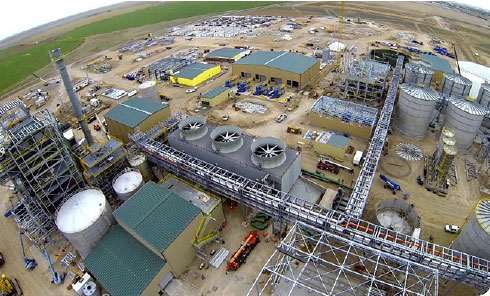
- Construction of the 200 MW photovoltaic plant for AES Solar in the California desert is in progress. It comprises 1,980 photovoltaic panels that track the sun. The plant is scheduled to progressively come into operation in the second half of 2014.
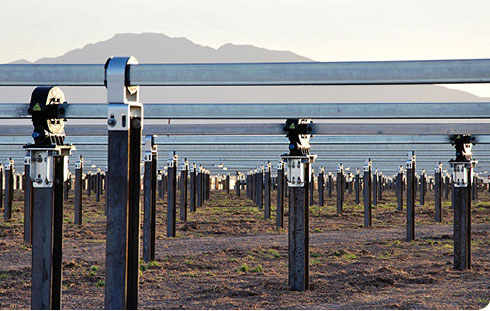
México
- Mexico’s Federal Electricity Board (Comisión Federal de Electricidad, or CFE) awarded Abengoa a contract for the engineering, construction and start-up of a 201 km, 400 kV transmission line and two substations in the state of Sonora in northwest Mexico. It is one of the largest transmission line projects awarded by the CFE in recent years.
- The CFE has also commissioned Abengoa to carry out the construction of a 49 km, 115 kV high voltage transmission line and two substations in the states of Hidalgo and Veracruz, in northwest Mexico. Completion of the project is scheduled for March 2014.
- The third major project being carried out with the CFE is the construction of Mexico’s biggest combined cycle plant, with 640 MW, in Centro Morelos. Turnkey contract, including one-stop engineering and construction. This plant will form part of the “Proyecto Integral Morelos” project, a key initiative in the development of central Mexico. It will generate enough power to supply more than 280,000 homes.
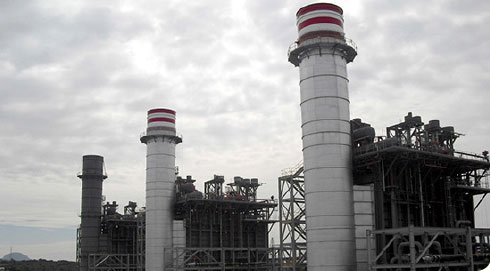
- Abengoa’s progress continues in the municipality of León (Guanajuato) with the construction of the El Zapotillo aqueduct for the National Water Board (Comisión Nacional de Agua, or Conagua), which will provide a means to supply drinking water to nearly one and a half million inhabitants. The engineering project includes the construction of 139 km of pipelines, a 3.8 ML/s capacity water treatment plant, a 100 ML storage tank and a 40 km distribution circuit. The company will operate the concession for 25 years.
Peru
- Abengoa won the international tender called by ProInversión, the state agency responsible for promoting private foreign investment in Peru, for the engineering, construction, operation and maintenance of the 354 km, 220 kV Machupicchu-Tintaya transmission line. The project includes the construction of two new substations and the extension of three others. It will allow for the reliable electricity supply in that part of the country.
- Construction of the 220 kV San Camilo transmission line and the La Joya substation for the mining company Cerro Verde in Arequipa, southern Peru, is in progress. This project also includes the engineering and start-up.
- Construction is ongoing of the 220-kV and 132-km Las Bambas - Cotaruse (ATN 2) transmission line. This project includes the development of the engineering, construction, start-up, operation and maintenance of the transmission line for 18 years.
- Southern Peru Copper Corporation (SPCC) again placed its trust in Abengoa Perú, awarding it the contracts for two transmission lines of 102 km in the department of Moquegua in southeast Peru. Abengoa Perú will be in charge of carrying out the engineering, procurement and construction of the 220-kV Moquegua transmission line, and the engineering and construction of the 138-kV Plaza Toquepala transmission line.
Brazil
-
The Brazilian National Electrical Energy Agency (Aneel) awarded a contract to Abengoa to carry out seven large-scale electricity transmission projects, totaling approximately 5,800 km. They include the design, construction and start-up of various transmission lines: the 615-km Pernambuco-Ceará, the 544-km Maranhao-Ceará, the 1,761-km Pará-Tocantins, the 1,816-km Tocantins and Maranhao, the 286-km Ceará-Río Grande do Nort and the 370 km Minas Gerais transmission lines, as well as the 367-km transmission line located in the states of Sao Paulo and Minas Gerais. The large-scale projects also include the construction of five substations and the extension of three others. Abengoa will also operate the concession of all the assets.
- The construction of one of the world’s longest direct current transmission lines is in progress for Aneel, spanning 2,412 km, with 600 kV and a load capacity of up to 3,150 MW. It will run from Porto Velho to Araraquara and carry the power generated by the Madeira hydroelectric system to São Paulo, Brazil’s main consumer. Abengoa will be responsible for the concession of the power transmission line.
- In addition, Abengoa won a five-year contract this year for the operation and maintenance of this and another line, also located in the Madeira system, which, spanning almost 5,000 km, will be the world’s largest direct current transmission system. The total load capacity of both lines will be in excess of 6,000 MW.
- Abengoa will be in charge of the construction, provision of equipment, maintenance and management of the care facilities of the future 30,000 m2 hospital of the northern region of Manaos, Brazil. The company will operate the concession for 18 years and has been developed in collaboration with local partners.
Argentina
- Abengoa will carry out a new project for Argentina’s Federal Council of Electric Energy (Consejo Federal de Energía Eléctrica) for the construction of 132 km of power transmission lines and three transformer stations in Aristóbulo del Valle and San Vicente, located in the province of Misiones, in northeast Argentina.
- Work is in progress for the Trust Fund Administration Committee (Comité de Administración del Fondo Fiduciario, or CAF) of the Federal Trust Fund for Electricity Transmission (Fondo Fiduciario para el Transporte Eléctrico Federal) of Argentina, on the turnkey construction of a 500 kV extra-high voltage transmission line spanning 65 km between Río Coronda and Rosario Oeste in the province of Santa Fe. The contract also includes the extension of both transformer stations.
Chile
- The construction is underway of a desalinated water transportation and distribution project, namely the 140 km Tierra Amarilla aqueduct for Compañía Minera del Pacífico (CAP). The aim of this project is to supply the mining industry, located in the Copiapó valley, in northern Chile, as well as the neighboring towns. It is scheduled to come into operation in March 2014.
- Abengoa will develop the electrical system of two new Metro lines in Santiago de Chile. The company will also be in charge of the engineering, equipment, testing and start-up of the railway traction substations of the two new train lines, the training of the Metro staff in Chile, and the maintenance of the substations for 20 years. Completion of the project is scheduled for 2018.
Uruguay
- Abengoa secured its position in the wind power market and consolidated itself as the first private wind power developer and operator in Uruguay, having been awarded a contract by the state-owned electric utility National Administration of Power Plants and Electrical Transmissions (Administración Nacional de Usinas y Trasmisiones Eléctricas, or UTE) for a new 70 MW wind farm. The company will be in charge of the construction, operation and maintenance of the wind farm for 20 years. It will supply renewable energy to a population of 100,000, curbing annual CO2 emissions by 140,000 t.
- Construction of the 50 MW wind farm in Cuchilla de Peralta (Tacuarembó) is in progress for UTE. The wind farm will have 25 wind turbines installed over an area of 1,400 ha. Apart from the design and construction, Abengoa will carry the operation and maintenance of the wind farm for 20 years. This project will supply renewable energy to a population of 50,000, curbing annual CO2 emissions by 100,000 t.
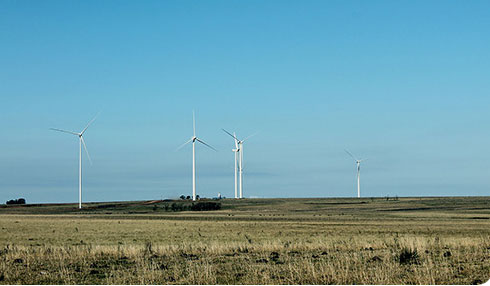
- The third wind farm in Uruguay is Cadonal, with a capacity of 50 MW and 25 wind turbines, weighing 367 t and standing 90 m tall. The wind farm stretches 20 km and is located on the outskirts of Trinidad, capital of the department of Flores. Abengoa will be responsible for the concession of the three wind farms.
- Abengoa is continuing with the construction of the 70 ML bioethanol plant for the state-owned company Alcoholes de Uruguay (ALUR). The plant will process sorghum, corn, barley and wheat and is located in Paysandú, in the west of Uruguay. The project also includes the construction of an annexed 8 MW cogeneration facility, which will supply the main plant with electricity and steam using biomass as feedstock.
Africa
Kenya
- Abengoa was awarded a contract by the state-owned Kenya Transmission Company (Ketraco) for the development of an electricity transmission project spanning 132 km from Lessos to the border with Uganda, as well as the extension of a substation. The project includes the engineering, construction and start-up of the transmission line. Completion of the project is scheduled for November 2014.
South Africa
- Construction is underway in South Africa of the 50 MW Khi Solar One plant, one of the world’s largest plants with tower technology. With a two-hour power storage capacity, the plant covers an area of 600 ha and is located near Upington in the province of Northern Cape. Its completion is scheduled for the end of 2014.
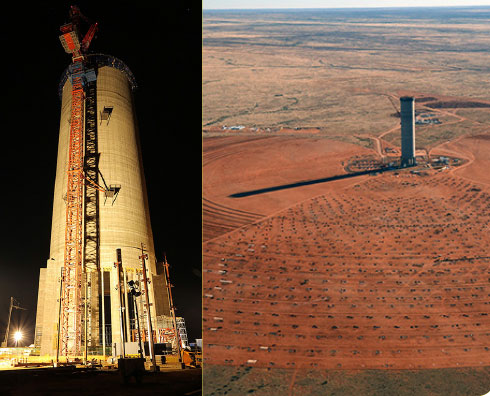
- Abengoa is also constructing the 100 MW KaXu Solar One parabolic trough plant in South Africa. With a three-hour storage capacity it will occupy a surface area of 1,100 ha. The plant is located in the same province as Khi Solar One. Completion of the project is scheduled for the beginning of 2015. Kaxu and Khi are South Africa’s first two solar thermal plants and their contracts were awarded to Abengoa by the South Africa Department of Energy.
- These two major projects with the DOE see the addition of Xina Solar One, a new 100-MW solar plant with parabolic trough technology that will permit the storage of electricity for up to five hours after sunset. Together with Kaxu, it will form part of Africa’s largest solar power platform. The plant will generate clean energy for 90,000 homes, curbing CO2 emissions by 398,000 t.
Algeria
- Construction is in progress in Tenes, Algeria, of a new desalination plant using reverse osmosis technology, with a daily water desalination capacity of 200,000 m3.
Ghana
- The company is developing its first project in Ghana, namely a reverse osmosis desalination plant with a daily water production capacity of 60,000 m3, which will be the first desalination plant in west Africa. Completion of the project is scheduled for August 2014.
Angola
- The Xangongo water treatment plant (WTP) in Angola has been completed and will produce 16.3 ML/day of treated water from the Cunene river. It includes the operation of the 100 km pipeline for the transportation of water between the WTP and the towns of Mongua and Ondjiva.
Asia
Israel
- The Government of Israel has awarded a contract to a consortium comprising Abengoa and a local partner for the development of the country’s largest solar thermal plant, namely Ashalim, with a capacity of 110 MW. Using parabolic trough collectors, it will be the first plant with molten salt storage system to generate energy for 4.5 h at night.
India
- In Gujarat, India, Abengoa has completed construction of a plant for the manufacture of metal tower structures for transmission lines and solar supports with an annual production capacity of 30,000 t. The project is financed by the International Finance Corporation.
Saudi Arabia
- Construction is in progress on the Medina-Mecca high-speed railway system. The contract for this project was awarded to the Spanish-Saudi consortium comprising Abengoa and other partners. It includes the construction and assembly of the 450 km railway system, permitting trains to run at 350 km/h. The contract includes the full maintenance of the railway system for twelve years.
Oman
- Abengoa is working on the construction of the reverse osmosis desalination plant for ACWA Power International which will supply 225,000 inhabitants in Barka, in northwest Oman. Abengoa is also in charge of the design, engineering, operation and maintenance.
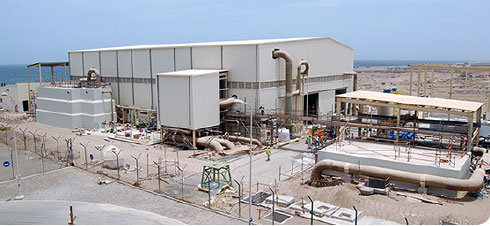
Sri Lanka
- Construction is underway of a drinking water plant in Sri Lanka. With a daily water treatment capacity of 13,000 m3, the project also includes the construction of water catchment systems at the Kalu Ganga river, a 2,500 m3 storage tank and almost 20 km of pipelines for the distribution of treated water at the plant.
Europe
Ukraine
- Abengoa has been selected by Ukrenergo, Ukraine’s state-owned energy company, to construct a 187 km transmission line from Zaporozhye nuclear power plant to Kakhovska substation in southeast Ukraine. The project, financed by the European Bank for Reconstruction and Development (EBRD), will be completed in June 2015.
Poland
- The construction is in progress of the largest combined cycle plant in Poland, with a capacity of 450 MW, for the Polish part state-owned energy and gas distribution company. The facility, located in Stalowa Wola, 200 km southeast of Warsaw, has one gas turbine, one steam turbine and a recovery boiler to generate electricity. It will supply electricity, heat and hot water to some 10,000 homes. This project led to Abengoa’s entry into the Central European market. The company will also take charge of the operation and maintenance of the gas turbine for the first 12 years.
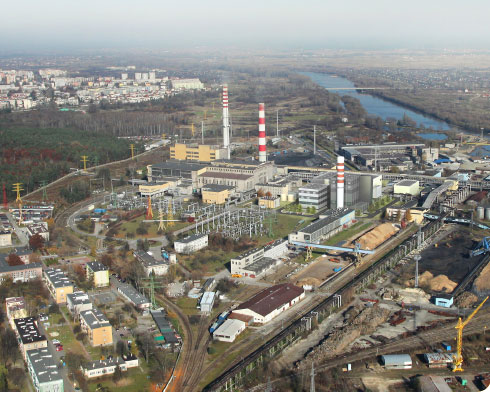
Spain
- Abengoa is building the Costa del Sol Hospital in Malaga. The company has a 40-year concession of the entire 31,000-m2 hospital area and will manage the 25,000-m2 parking lot (960 spaces).
France
-
Abengoa has a long-term contract with Réseau de Transport d’Électricité (RTE), France's electricity transmission system operator. The company carries out studies, works and maintenance on various high-voltage transmission lines, including high-voltage underground transmission lines.
-
The company has carried out various catenary and electrification works for the Société Nationale des Chemins de Fer (SNCF), state-owned railway company in charge of operating France's national rail services.
Solar business
The solar thermal market is immersed in a consolidation phase on the international arena. In this phase, only the most competitive companies have the opportunity to play a leading role on international markets. Having a proprietary technology portfolio is essential to be able to continue offering solutions tailored to the needs of each customer at competitive prices.
This is why the development of new technologies, together with the design and manufacture of certain key components, which can be applied at the company’s own plants and sold to third parties, is one of the areas of activity on which Abengoa bases its medium and long-term growth.
Strategic positioning in the different phases of the value chain of the solar thermal business, including plant operation and maintenance, gives Abengoa a significant advantage in the sector, while enabling it to offer technology and solutions tailored to greater customer satisfaction. In this regard, Abengoa focuses the industrial production of its solar business on:
- The signing of strategic alliances for the development of new, more efficient equipment and components.
- The design, manufacture and sale of key components for its own plants and those of third parties. This is the case, for example, with the company’s parabolic trough collectors, collectors for industrial applications, mirrors for parabolic trough plants and tower facets, and the high concentration photovoltaic systems.
- The signing of solar technology transfer agreements.
- The provision of equipment and services for the operation and maintenance of solar power plants, owned by the company or third parties.
Abengoa´s solar business has continued with its commitment to innovation in 2013, specifically in those technologies flagged as key, with a view to keeping ahead of its competitors, while lowering costs and making them more efficient. In addition, as a supplementary line of business, Abengoa licenses and transfers these technologies and know-how to third parties, generating cash flow through commercial intellectual property agreements, in the form of royalties or fees.
Likewise, the company continues to channel many of its resources into expanding its portfolio of components by seeking out new technological partnerships and strategic alliances with leading companies and institutions, shaping marketing strategies for its current portfolio of technologies and in the development of, and securing protection for, its intellectual property, thus helping to secure its ongoing technological and commercial leadership.
Thanks to its position as the world’s top company in terms of solar thermal capacity, Abengoa has built up a wealth of knowledge in plant operation and maintenance, enabling it to make groundbreaking improvements in plant design, construction and operating methods. This is why Abengoa is the leading company in the operation and maintenance of its own and third party solar thermal plants, always achieving the maximum performance demanded of a facility, while continuously applying improvements based on experience.
In addition, Abengoa achieves some of the highest power generation levels, both nationwide and internationally, by combining the aforementioned knowledge with the highest work standards, a set of tools specifically developed to provide this service to the company’s plants, and its full adherence to health and safety standards.
Significant milestones in last year’s industrial production include:
ASUP 140 heliostat
Having validated the design at the Solucar Complex during the last months of 2012, installation of the ASUP 140 heliostat is underway at the Khi solar field project in South Africa. The installation of this new heliostat has resulted in a solar field cost reduction of almost 30 % thanks to the introduction of an innovative facet concept that combines 2 mm-thick, highly reflective glass with a foam that gives it bearing capacity and an optimized structure that minimizes material requirements.
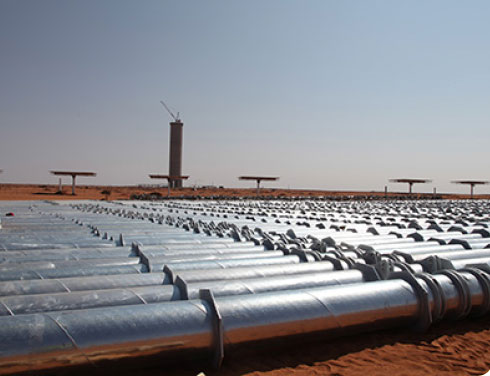
New generations of parabolic trough structures
Abengoa continued optimizing the design of its E2 trough in 2013. This model features design improvements that allow for a more efficient installation and improved operational performance.
The year 2013 also saw the construction of the first large opening SpaceTube collector module at the Solucar Complex, with an opening of more than eight meters. This project validates the improvements implemented in technology, such as the higher concentration factor, resulting in a considerable cost reduction in the parabolic trough solar field.
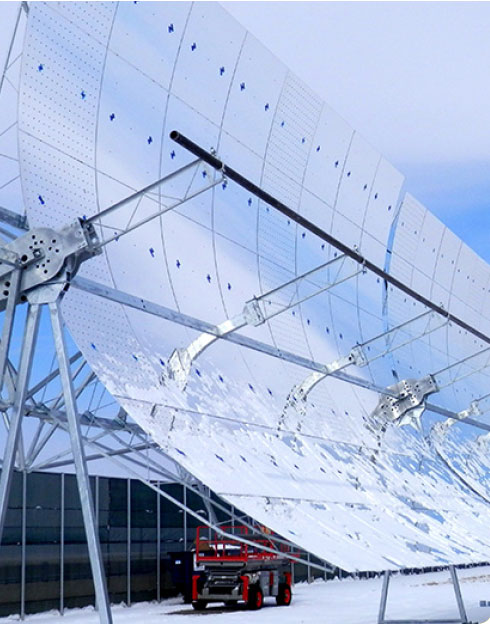
Operation and maintenance equipment
The existing equipment for the operation and maintenance of solar power plants, such as the Condor reflectometer and the parabolic trough collector and heliostat cleaning trucks, has seen the addition of a new piece of equipment that measures the performance of the receiver tubes in parabolic trough technology. The Mini Incus spectrophotometer is a portable device that aids in the operational optimization of solar thermal parabolic trough plants, thanks to an efficient characterization of the receiver tubes.
The Mini Incus is especially designed for the on-site evaluation of the receiver tube’s optical properties, transmittance and absorbance, measuring 15 wavelengths, uniquely distributed throughout the solar spectrum.
The operation of this development has already been validated at the Solnova 1 plant and presented at the international SolarPaces conference in 2013, coinciding with the launch of the equipment on to the market.
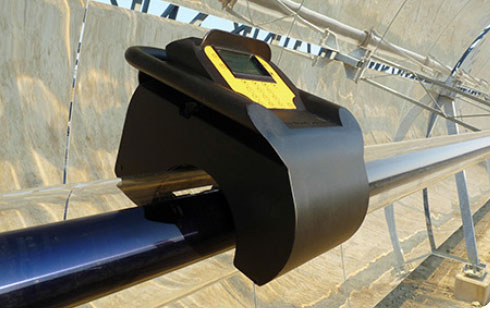
Operation and maintenance services
The company’s consolidated experience in plant operation and maintenance and its continued commitment to R&D and innovation have enabled it to develop a specialized operation and maintenance service for its own plants and for third parties. With the start-up in 2007 of the company’s first commercial plant, PS10, and thanks to the gradual start-up of new solar power plants, embracing both power tower and parabolic trough technologies, the company has been able to steadily optimize plant start-up, and operation and maintenance, responding well to what has become a very demanding process. Abengoa has implemented a standardized plant operation monitoring system, allowing it to track changes in key plant operation areas and carry out benchmarking. The company has also continued harnessing synergies, as a result of grouping plants together at solar complexes.
With the goal of continuous improvement and to learn from past experiences, Abengoa´s solar business has rolled out training programs on operation and maintenance and how to capitalize on experience so that the company’s operators can tackle the operation and maintenance of new plants with a greater likelihood of success.
Industrial applications
Over the course of this year and having begun operations at the solar thermal plant owned by Minera del Tesoro in Chile, the company has continued offering thermal or steam power generation solutions to industrial customers, giving added value to their processes, while reducing their greenhouse gas emissions.
High concentration photovoltaic technology, or HCPV
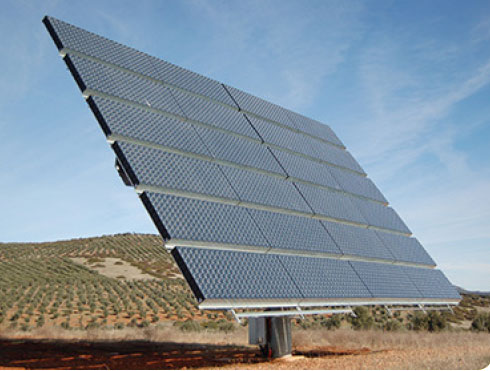
Abengoa is marketing its latest generation of high concentration photovoltaic technology with much higher efficiency and significantly more competitive installation costs than its predecessor. These breakthroughs, apart from affording improved performance under extreme temperature conditions and the resulting high efficiency, make the company’s photovoltaic technology highly competitive, permitting cost reductions while increasing module efficiency.
Tests have confirmed the efficiency of the technology with the installation of three pilot plants in Puertollano with a total of 300 kW, together with validation systems at other locations such as India, Brazil and Saudi Arabia. In addition, Abengoa’s HCPV modules successfully passed the tests in accordance with the requirements of standard IEC 62108, which means they are in optimal conditions to be put on the market.
Another important achievement in the area of photovoltaics is the inauguration of the Soland Technology Center. This new infrastructure has led to important capabilities in optics, chemistry, electronics and solar laboratories, and in the characterization of materials and reliability, as well as a pilot plant for the development of solar photovoltaic technology. This serves to foster the development of new photovoltaic technologies, while supporting the commercialization of previously developed technologies.
Technology licenses
Abengoa licenses its developed technologies, taking into account their innovative nature and maturity on the market, generating cash flow through commercial intellectual property agreements, in the form of royalties or fees.
Key industrial solar products and services in 2013
- More than 4,120 heliostats and 3,100 E2 parabolic trough collectors have been sold in different countries.
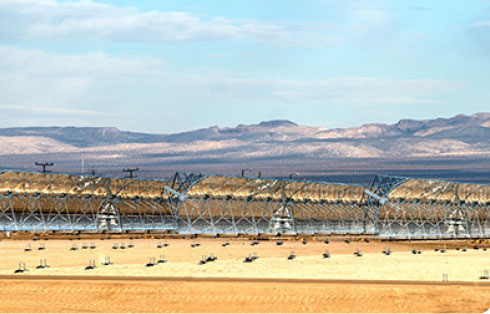
- As regards equipment and services for operation and maintenance, Abengoa´s solar business provides O&M services to 17 solar thermal plants and 5 photovoltaic plants.
In addition, as regards photovoltaic technology, the installation of various demonstration high concentration photovoltaic systems has been completed in Saudi Arabia and India.
It is important to point out that the progress made by the company with proprietary technology has enabled it to continue cutting power generation costs and capitalize on its investments in R&D and innovation through technology transfers to third parties for the construction of solar power plants. The company is confident that this line of business will continue to generate significant revenue over the coming years on the back of its proactive management of its technologies portfolio, which already features a number of new developments, coupled with a solid industrial production strategy.
Abengoa is an international leader in the construction of electrical infrastructures.
Value chain of Abengoa’s engineering and construction area.
Abengoa has unique engineering and construction management capabilities.
Power transmission lines constructed by Abengoa since 2000.
Abengoa’s projects in the energy and environment sectors.
Solar thermal plant in Mojave (California), which, like the Solana plant, will be one of the world’s largest solar plants.
Bioethanol plant in Hugoton (Kansas).
Photovoltaic solar panel field in the California desert.
Combined cycle plant in Morelos (Mexico).
Wind farm in Cuchilla de Peralta.
The Khi Solar One tower is South Africa’s second tallest construction.
Reverse osmosis desalination plant in Barka (Oman).
Combined cycle plant in Poland.
View of the heliostats of the Khi Solar One solar tower plant with superheated steam technology, located in the Northern Cape province (South Africa).
SpaceTube parabolic trough collector, research project with an aperture of over eight meters.
The Mini Incus device, placed on the absorbing tube of the parabolic trough collector, aids in the operational optimization of solar thermal plants.
High concentration photovoltaic (HCPV) module that reaches levels of over 30 % efficiency. The combination of the T140TM solar tracker and the M300TM module provides optimal efficiency for photovoltaic plants that supply the electricity grid.
View of the Mojave parabolic trough collectors. In the background are the desert mountains of Arizona.
© 2013 Abengoa. All rights reserved
